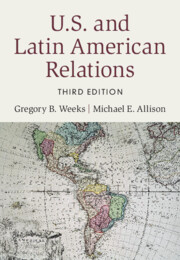4 results
4 - The Temporality of IR Theories
-
- Book:
- The Time of Global Politics
- Published online:
- 23 November 2023
- Print publication:
- 07 December 2023, pp 100-142
-
- Chapter
- Export citation
2 - The International Legal Field
-
- Book:
- Responsibility on Trial
- Published online:
- 09 February 2023
- Print publication:
- 16 February 2023, pp 33-62
-
- Chapter
- Export citation

U.S. and Latin American Relations
-
- Published online:
- 08 December 2022
- Print publication:
- 01 December 2022
-
- Textbook
- Export citation
1 - The Theoretical Context of U.S.–Latin American Relations
-
- Book:
- U.S. and Latin American Relations
- Published online:
- 08 December 2022
- Print publication:
- 01 December 2022, pp 1-16
-
- Chapter
- Export citation

